Projects & Partnerships > TEEP > Syllabi Bank
Teacher Environmental Education Preparation (TEEP)
Syllabi Bank
List of Courses and their Syllabi
Bank Street (1) | CCNY/CUNY (3) | NYU (3)
| Bank Street College of Education Course | ||
| EDUC 551: Science Inquiry for Children in the Natural Environment Students investigate the natural environment, at Bank Street and the Tiorati Workshop for Environmental Learning in Harriman State Park, to focus on the theory and practice of natural science. Students conduct inquiries under the principle that teachers should learn significant science concepts in ways that they are expected to teach. Students investigate materials, science concepts, and teaching strategies that are appropriate for preschool and elementary school learners. Class sessions include field explorations at the Tiorati Field Site. |
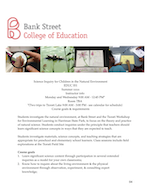 |
|
| CCNY/CUNY Courses | ||
| Science 12500: Principles of Life Science: Fall 2019 For undergraduate students who will be elementary school teachers. The goal is for the students to get to know street trees and local arthropods, so that they will be more likely to engage with this biodiversity once they have their own classroom. |
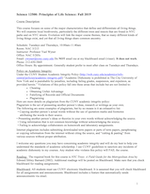 |
|
| SCI 12600: Principles of Environmental Science For undergraduate students majoring in childhood education. It is an environmental science class designed around GLOBE protocols. It provides students with the tools to do outdoor science education with their students. |
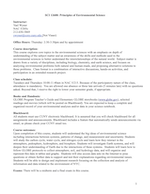 |
|
| BioE 6100E 3GG (3679): Ecology Disrupted: Sustainability and human environmental impact For students getting a master's in secondary science education. This course aims to connect student daily life to ecology and sustainability. |
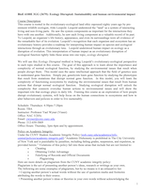 |
|
| NYU Courses | ||
| ECED-GE 2314 Social Studies and Science Experiences for Younger Children, Fall 2020 See Course Description for Fall 2019, below. |
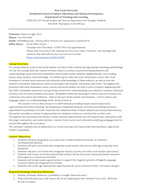 |
|
| ECED-GE 2314 Social Studies and Science Experiences for Younger Children, Fall 2019 Course Description: Experiences for developing children's concepts & skills in social studies & science. Program planning & use of resources: the out-of-doors, maps, globes, books, pictures & other media. Includes techniques for integrating the two content areas, evaluating current materials, & adapting programs for special students in regular classrooms. |
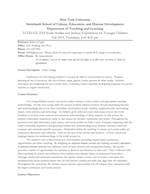 |
|
| Using Non-formal Resources to Teach Science and Sustainability SciEd-2050, SciEd-1050 Course Overview: In this course, students will learn about the variety of non-formal settings as contexts for teaching and learning about science, sustainability, and the urban environment. Students will consider their roles as teachers and learners to link activities with inquiry, reflection and practice, through virtual and real world experiences. ... (cont. in PDF file) > |
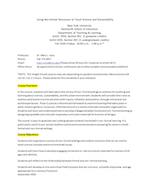 |
|
